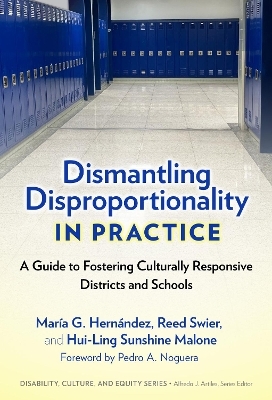
Dismantling Disproportionality in Practice
Teachers' College Press (Verlag)
978-0-8077-6945-4 (ISBN)
This resource offers culturally responsive processes and concrete tools to address disproportionality and create more equitable schools. The authors draw on their work with school districts to demonstrate how using a theory of change can address disproportionate outcomes of special education placement and exclusionary discipline for students of colour. Educational institutions can use this application guide to build educators' capacities so that they respond better to the needs of racially, culturally, and linguistically marginalized students, families, and communities. The book includes chapters dedicated to the process of an equity audit to identify and tackle the root causes of disproportionalities; approaches for partnering with young people toward creating an environment every student deserves; and the critical self-reflective work that is foundational to shift the experiences and outcomes of Black, Latinx, Indigenous, multilingual learners, and students with an IEP, as well as students with intersecting identities. Use Dismantling Disproportionality in Practice to guide your work with district and school leaders and staff, teachers, families, and youth.
Book Features:
This companion to Dismantling Disproportionality: A Culturally Responsive Sustaining Systems Approach (2023) offers lessons learned from a former state-funded technical assistance center.
Applicable tools and processes to help school districts confront beliefs, policies, procedures, and practices that result in disproportionate outcomes and experiences.
A holistic look at what equitable and culturally responsive schools look like and actionable steps for creating these spaces.
Tangible exercises and examples from two decades of experience centering equity within school systems.
Guidance for partnering with youth to create equitable, systemic change alongside school leadership.
María G. Hernández has over a decade experience partnering with pre-K-12 educators, providing technical assistance and training to develop culturally responsive education systems that address disproportionality and equity. Reed Swier is a former elementary teacher and administrator currently providing culturally responsive training and technical assistance to educators and district leaders. Hui-Ling S. Malone is an educator, researcher, consultant, scholar-activist, and an assistant professor of education at the University California, Santa Barbara.
Foreword
Preface
Acknowledgments
1. Introduction
The State of the Work
So What Can This Active Equity Work Look Like?
Moving Systems
Setting the Table for Systems Work: Processes for CR-SE Engagement
What to Expect in the Proceeding Chapters
2. Authentic CR-SE: Tackling Beliefs Through Self to System Reflection and Action
Why Culturally Responsive-Sustaining Education (CR-SE)?
Foundational Understandings (Preconditions) Critical to CR-SE and Self to System Work
From Foundational Understandings to CR-SE Self to System Application
Connecting Self to System
Critical Questions
3. Understanding the Root Cause Analysis Process
Framing the Importance of the Root Cause Process
Preconditions for Root Cause Analysis
The Root Cause Analysis Process
Root Cause Analysis Tools
Promising System Shifts
Conclusion
Critical Questions
4. Applying an Inquiry Approach: An Example Root Cause Analysis Process
Garner Central School District: Applying a Root Cause Analysis
Grounding the Work in a Moral Imperative
District Data Analysis
Examining Key Policies and Practices
Policy and Practice: Code of Conduct and Discipline Referral Form Examples and Advanced Placement, Honors, International Baccalaureate, and Gifted and Talented Form
Examining Staff Beliefs
Getting to Root Causes
Action Planning After a Root Cause Analysis
Directions as You Move Through Action Planning
Action Planning Tip
Avoiding Detours: District Successes and Challenges
Conclusion
Critical Questions
5. How Can Districts and Schools Leverage Student Voice in Addressing Disproportionality?
(Re)Defining Disproportionality
Solidifying Sustaining Youth-Adult Partnerships
Establishing the Partnership
Establishing a Contact Zone
Political Education
The YPAR Project
Conclusion
Critical Questions
6. Conclusion
From Self to System
Commitment to Doing the Work: Voices from CSC CR-SE Work
District Example Building Educator and Systemic Capacity
Conclusion and What Is Next?
Glossary
Endnotes
References
Index
About the Authors
| Erscheinungsdatum | 18.05.2024 |
|---|---|
| Reihe/Serie | Disability, Culture, and Equity Series |
| Verlagsort | New York |
| Sprache | englisch |
| Maße | 162 x 235 mm |
| Gewicht | 272 g |
| Themenwelt | Sozialwissenschaften ► Ethnologie |
| Sozialwissenschaften ► Pädagogik ► Sonder-, Heil- und Förderpädagogik | |
| Sozialwissenschaften ► Soziologie | |
| ISBN-10 | 0-8077-6945-2 / 0807769452 |
| ISBN-13 | 978-0-8077-6945-4 / 9780807769454 |
| Zustand | Neuware |
| Haben Sie eine Frage zum Produkt? |
aus dem Bereich


